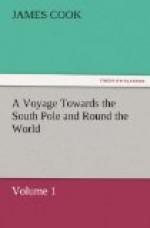Before I sailed from England, I was informed that a Spanish ship had visited this isle in 1769. Some signs of it were seen among the people now about us; one man had a pretty good broad-brimmed European hat on, another had a grego jacket, and another a red silk handkerchief. They also seemed to know the use of a musquet, and to stand in much awe of it; but this they probably learnt from Roggewein, who, if we are to believe the authors of that voyage, left them sufficient tokens.
Near the place where we landed, were some of those statues before mentioned, which I shall describe in another place. The country appeared barren and without wood; there were, nevertheless, several plantations of potatoes, plantains, and sugar-canes; we also saw some fowls, and found a well of brackish water. As these were articles we were in want of, and as the natives seemed not unwilling to part with them, I resolved to stay a day or two. With this view I repaired on board, and brought the ship to an anchor in thirty-two fathoms water; the bottom a fine dark sand. Our station was about a mile from the nearest shore, the south point of a small bay, in the bottom of which is the sandy beach before mentioned, being E.S.E., distant one mile and a-half. The two rocky islets lying off the south point of the island, were just shut behind a point to the north of them; they bore south 3/4 west, four miles distant; and the other extreme of the island bore north 25 deg. E., distant about six miles. But the best mark for this anchoring-place is the beach, because it is the only one on this side of the island. In the afternoon, we got on board a few casks of water, and opened a trade with the natives for such things as they had to dispose of. Some of the gentlemen also made an excursion into the country to see what it produced; and returned again in the evening, with the loss only of a hat, which one of the natives snatched off the head of one of the party.
Early next morning, I sent Lieutenants Pickersgill and Edgecumbe with a party of men, accompanied by several of the gentlemen, to examine the country. As I was not sufficiently recovered from my late illness to make one of the party, I was obliged to content myself with remaining at the landing-place among the natives. We had, at one time, a pretty brisk trade with them for potatoes, which we observed they dug up out of an adjoining plantation; but this traffic, which was very advantageous to us, was soon put a stop to by the owner (as we supposed) of the plantation coming down, and driving all the people out of it. By this we concluded, that he had been robbed of his property, and that they were not less scrupulous of stealing from one another, than from us, on whom they practised every little fraud they could think of, and generally with success; for we no sooner detected them in one, than they found out another. About seven o’clock in the evening, the party I had sent into the country returned, after having been over the greatest part of the island.




